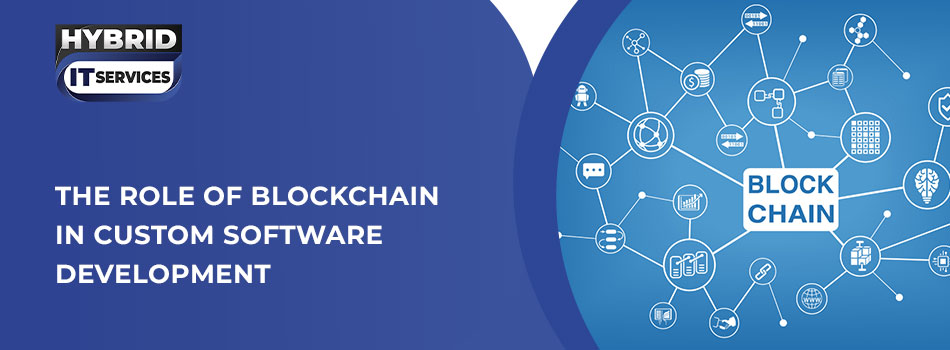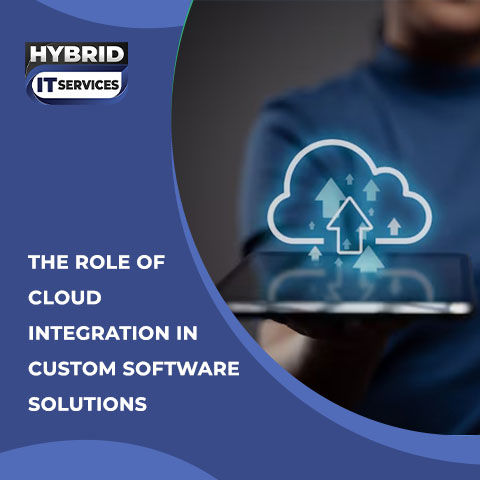Blockchain is a new database type that enables safe, open, and unchangeable transactions. Imagine a chain of blocks where each block contains data; once added, it is hard to change. Each subsequent block of information is connected to cryptographic hashes, which form what we call a blockchain. This technology ensures that information remains tamper-proof and traceable.
Blockchain technology brings revolutionary possibilities to custom software development. With the help of blockchain technology, developers can create decentralized applications. These software solutions eliminate the need for intermediaries like banks or servers.
At Hybrid IT, Custom Software Development Phoenix, let's discuss the benefits of blockchain technology in software development.
Role of Blockchain Integration for Custom Software
Blockchain technology in custom software development is like a digital ledger. This ledger records transactions securely and transparently. Imagine it’s like a notebook with all transactions written on it; every transaction is a block.
Once a note is written, it cannot be changed. This makes it safe because everyone sees what is recorded or written, but no one can tamper with it.
For a deeper understanding of how software solutions can be structured, you may want to explore What Does a Software Development Company Do? which outlines the essential functions and services a software development company offers when working on custom solutions like blockchain.
Unparalleled Security and Privacy
A customized blockchain software solution remarkably surpassed generic solutions. It has surprising capabilities and extent of security. If your business handles sensitive data, the immutable nature of this technology protects information from being tampered with. Data anonymization further fuels privacy and warrants that no unauthorized parties can view what you recorded.
The healthcare industry can significantly benefit from implementing blockchain to secure private patient information. such as electronic medical records or pharmaceutical prescriptions.
It propels an innovative way of safely exchanging medical history between the patient and the healthcare providers. This all happens without the risk of data breaches.
Learn more about how custom software can be adapted to specific industries in Why Your Business Needs Custom Software Development, where we explore industry-specific applications such as healthcare.
Improved Transparency
Since every participant in the network has access to a distributed database verified by each node and protected, the possibility of fraud is virtually diminished.
Record visibility and traceability can build trust between stakeholders and business owners, especially in sectors where forgery is widespread.
Financial and banking institutions are the most common applicants for blockchain development services since they can create personalized systems that address issues with transparency. Custom solutions that are decentralized and immutable can help combat the increasing risk of fraudulent activities associated with fintech.
Greater Automation
The lack of third-party intermediaries, paper-heavy work, and time-consuming approvals from centralized authorities make operations on the blockchain outstandingly efficient. Automation driven by agreements like smart contracts also significantly reduces the rate of human error and redundancy without compromising security and verification.
Retailers can reap the benefits of a more efficient operational process and inventory management by reducing errors and streamlining supply chain management. The ability to quickly trace the product to its origin or the customer can support an often-overloaded system, further fostering resilience in supply chain disruptions.
Decentralization
One of the key features of blockchain technology is its decentralized nature, which eliminates the need for intermediaries and central authorities. This decentralization ensures that data is stored securely and transparently, reducing the risks of fraud and manipulation.
Immutable Records
Blockchain technology utilizes a consensus mechanism to validate transactions, making the records immutable and tamper-proof. This ensures data integrity and enhances trust in software applications.
Smart Contracts
Smart contracts are self-executing contracts with predefined rules and conditions coded into the blockchain. These contracts automate processes, reducing the need for manual intervention and streamlining workflow efficiency.
Challenges in Integrating Blockchain into Custom Software Development
Considering that we have unearthed the core principles of how blockchain works and how it can advance your business, it may seem that there are no downsides to adopting this tech.
But it would not be fair if we only looked at the bright side and ignored the real challenges you will likely face. Let’s closely examine the pitfalls you can encounter during blockchain software development.
Integration challenges can occur in various tech stacks. For more about common pitfalls in custom software development, check out Top Mistakes to Avoid in Custom Software Development, where we discuss integration issues and solutions.
Interoperability and Scalability
Integrating blockchain software into existing systems may pose a significant challenge, as distributed ledgers often operate on an individual level.
Sharing data between several networks will likely require development professionals to devise custom solutions to connect the systems and enable interoperability. This challenge is generally attributed to a lack of a standardized approach and protocols within the blockchain.
Scalability can also raise questions since ledgers may face bottlenecks as more blocks are added to the chain. The bigger the database, the slower the recording and retrieval of data can become. This pushes software specialists to find innovative ways to scale blockchain solutions to withstand increasing loads of operations.
High Energy Consumption
The resources required to run procedures like a Proof of Work consensus mechanism pose environmental concerns due to their high energy consumption.
This can strain the participants’ hardware and ultimately not be worth the resource spending. However, custom software development services offer more sustainable alternatives to mitigate these worries.
For instance, mechanisms like Proof of Stake and Proof of Authority are considered more energy-friendly, making them a preferred way for businesses to verify data. Still, the downsides of these alternatives include a less decentralized and unbiased verification method.
Regulatory Landscape
As with any new technology, the regulatory landscape is usually slow to follow the advancements, leading to ever-evolving compliances and legal standards. For blockchain software solutions, regulations still don’t fully account for every intricacy, which means the rules might change in the future.
Areas like data protection, enforced by GDPR, and country-specific regulations may hinder blockchain's potential to operate at its full capacity. Nonetheless, it is worth mentioning that a few large corporations are already actively using this technology. While navigating a fluctuating landscape like this can be difficult, it’s not impossible.
Steps to Implement Blockchain Technology in Software Development
Implementing blockchain in software development requires a structured approach. Here’s a comprehensive guide to get started:
- Define Project
- Select the right blockchain platform
- Develop a Blockchain Model
- Integrate with the existing system
- Test and Deploy
The Future of Blockchain Technology and custom software development
According to recent studies, the blockchain technology market is estimated to reach nearly $40 billion in 2025. As businesses seek innovative ways to digitize their operations, blockchain offers a promising avenue for software developers to create secure and efficient solutions for their clients.
- Decentralized Finance
- Blockchain as a service
- Artificial intelligence
- Internet of Things (IoT)
AI-Powered Custom Software Development Services Phoenix, Arizona
With AI, your software can adapt and improve over time, offering personalized user experiences, optimizing operations, and predicting future trends. Imagine software that grows with your business, optimizing operations in real time, identifying inefficiencies, and suggesting actionable improvements before you even notice the problems.
At custom software development Phoenix, we're not just building software. We're building the future of your business. Explore the features:
- Expertise across industries
- Customized to your business need
- Scalable solutions
- Competitive advantage
- Enhanced Security
Imagine software that grows with your business, optimizing operations in real time and identifying inefficiencies.
Consult now for customer software that suggests actionable improvements before you even notice the problems.
Conclusion
Blockchain is a revolutionary technology that offers immense potential for software development. From enhancing security to enabling automation and decentralization, its applications are limitless. As developers and businesses continue to explore its possibilities, blockchain technology will undoubtedly become a cornerstone of innovative software solutions. Now is the time to embrace this technology and harness its full potential in your projects.






